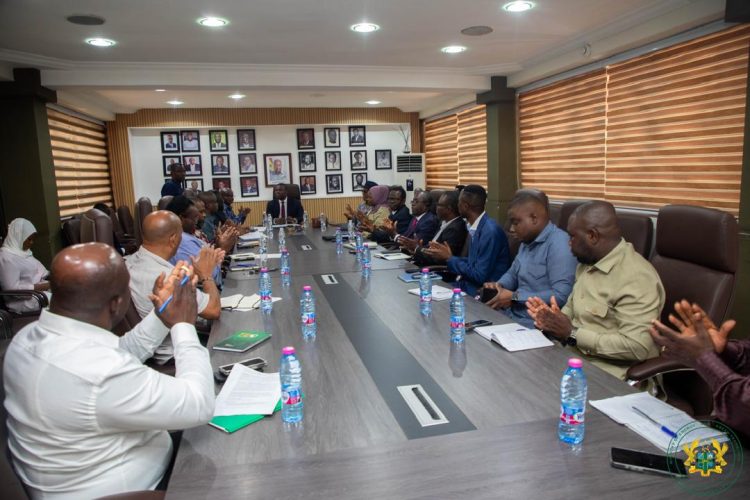The government of Ghana has been exploring partial privatization models for the Electricity Company of Ghana (ECG) as a strategic measure to address the mounting debt burden in the energy sector, which continues to weigh heavily on the public purse.
As part of this effort, an eight-member Private Sector Participation (PSP) Steering Committee has been inaugurated to provide oversight for the implementation of a Multiple Lease Model (MLM) to revamp electricity distribution across the country.
Announcing the committee’s formation, Minister for Energy and Green Transition, Hon. John Jinapor emphasized the need for bold reforms in the electricity sector.
“The Multiple Lease Model is a cornerstone of the government’s broader energy sector recovery and modernization strategy.”
Hon. John Jinapor, Minister for Energy and Green Transition
The decision to explore privatization comes at a time when Ghana’s energy sector faces significant financial challenges, including high operational costs, increasing debts, and inefficiencies in electricity distribution.
ECG, which is responsible for providing electricity to a large portion of the population, has been struggling with revenue collection and technical losses.
The government believes that allowing private sector participation will inject much-needed investment into infrastructure and improve service delivery.

Under the MLM approach, electricity distribution services will be segmented into regional units, each managed by different private operators.
This model seeks to attract credible investors, reduce technical and commercial losses, and enhance customer satisfaction nationwide.
Hon. Jinapor, who also played a key role in the committee’s inauguration, outlined the responsibilities of the PSP Steering Committee.
“The Committee will be responsible for reviewing and advising on transaction documents, procurement frameworks, draft agreements, risk mitigation strategies, regulatory compliance, and stakeholder communications.”
Hon. John Jinapor, Minister for Energy and Green Transition
The Committee will also coordinate with ECG, the Northern Electricity Distribution Company (NEDCo), regulatory bodies, and transaction advisors to ensure the successful implementation of the model.
Additionally, it is tasked with gathering baseline data, including auditing the PSP deal, and overseeing progress across critical milestones.

“The PSP Implementation Unit within the Ministry will act as the Secretariat to the Committee, offering technical and administrative support throughout the implementation process.”
Hon. John Jinapor, Minister for Energy and Green Transition
To ensure accountability and efficiency, three sub-committees—Technical, Governance & Regulatory, and Stakeholder Management—have been created to support the Steering Committee’s work.
The government has set clear timelines for the project. Hon. Jinapor directed that the procurement of all necessary technical, financial, and legal transaction advisors must be completed by May 31, 2025. This will pave the way for the commencement of detailed implementation processes.
The minister added, “By September 2025, we anticipate issuing the first phase of the competitive bidding documents for private concessionaires,” highlighting the government’s commitment to maintaining momentum in this reform effort.
Government to Prioritize Stakeholder Engagement

Mr. Jabesh Amissah-Arthur, Chair of the Technical Sub-Committee, expressed appreciation for the opportunity to contribute to a transformative national effort.
He acknowledged the scale of the task ahead but remained optimistic about the team’s ability to deliver.
“The road will be challenging and difficult, but I have confidence in the members that we will live up to expectations by providing guidance to the restructuring of the power distribution sector to ensure customer service satisfaction.”
Hon. John Jinapor, Minister for Energy and Green Transition
Industry analysts have welcomed the move as a pragmatic response to persistent inefficiencies and financial strain within Ghana’s power distribution system.
ECG has long been plagued by high distribution losses, low revenue collection, and a lack of investment in infrastructure.
The partial privatisation comes amid growing concern over the rising debt levels in Ghana’s energy sector, which continue to burden the national budget.
Authorities believe that PSP through the MLM will create a pathway for restoring ECG’s financial health while avoiding the pitfalls of previous single-concession models.
Past attempts at privatization, including the contentious Power Distribution Services (PDS) deal, were marred by legal disputes and public outcry. By contrast, the segmented MLM approach aims to create competition among operators and limit monopolistic tendencies.
The partial privatization of ECG through the MLM approach marks a pivotal moment for Ghana’s electricity sector. With strong oversight, technical expertise, and stakeholder engagement, the Steering Committee is expected to guide the country towards a more sustainable and efficient energy distribution system.
READ ALSO: Mahama Promises Revamp of Tema Oil Refinery Through PPP























